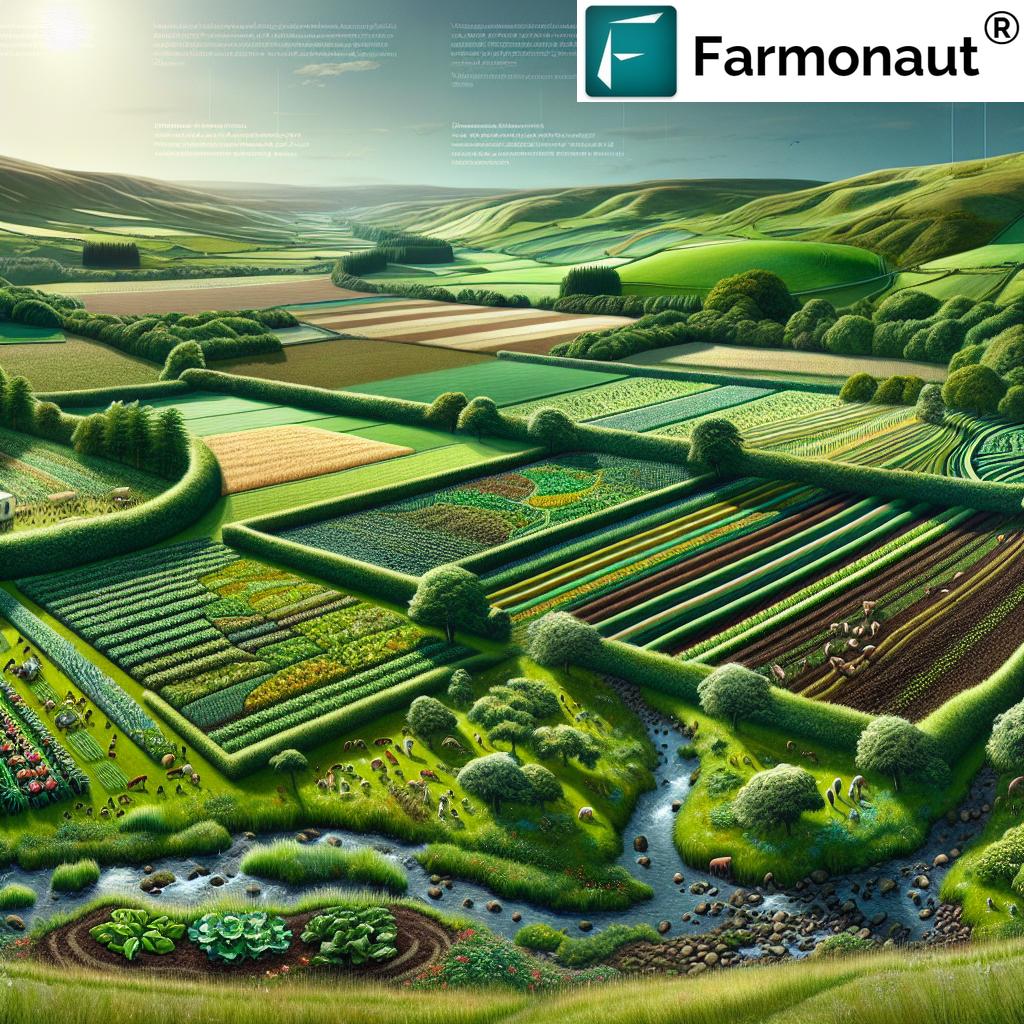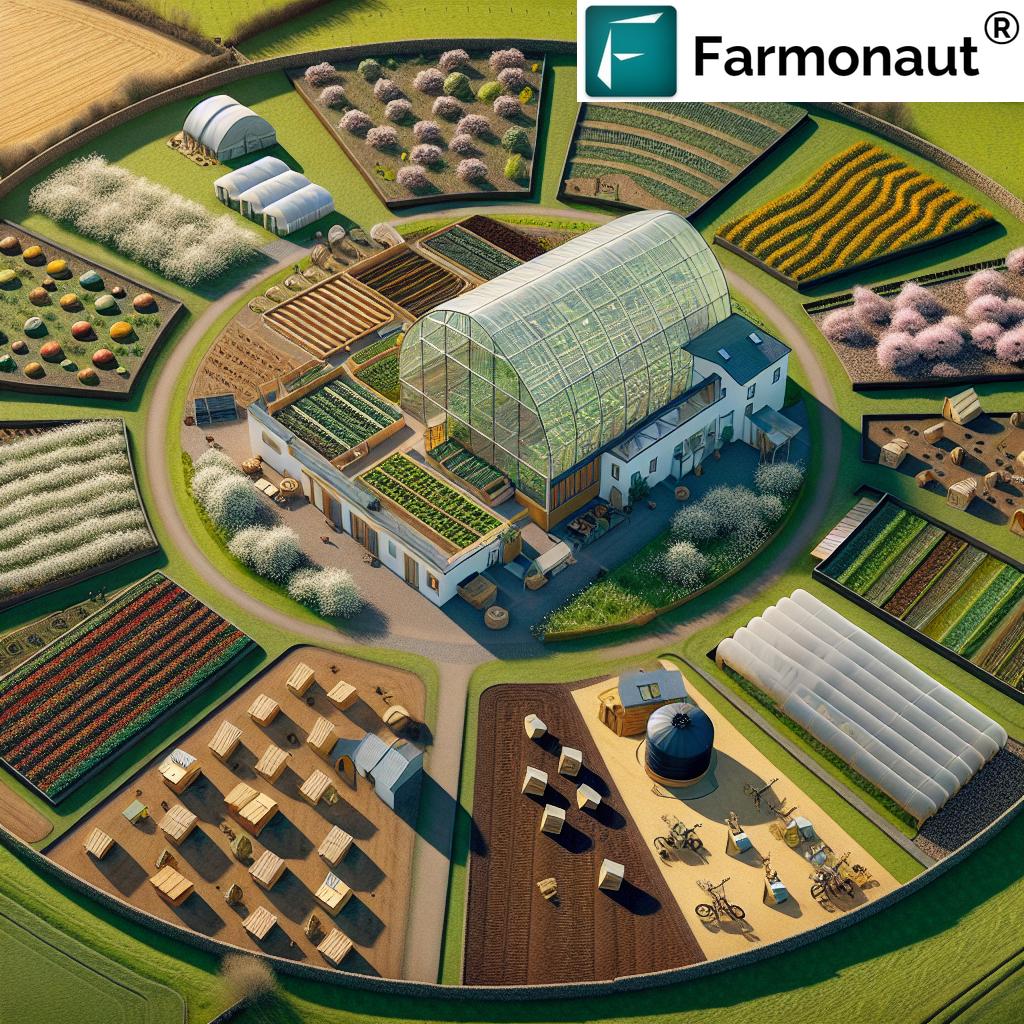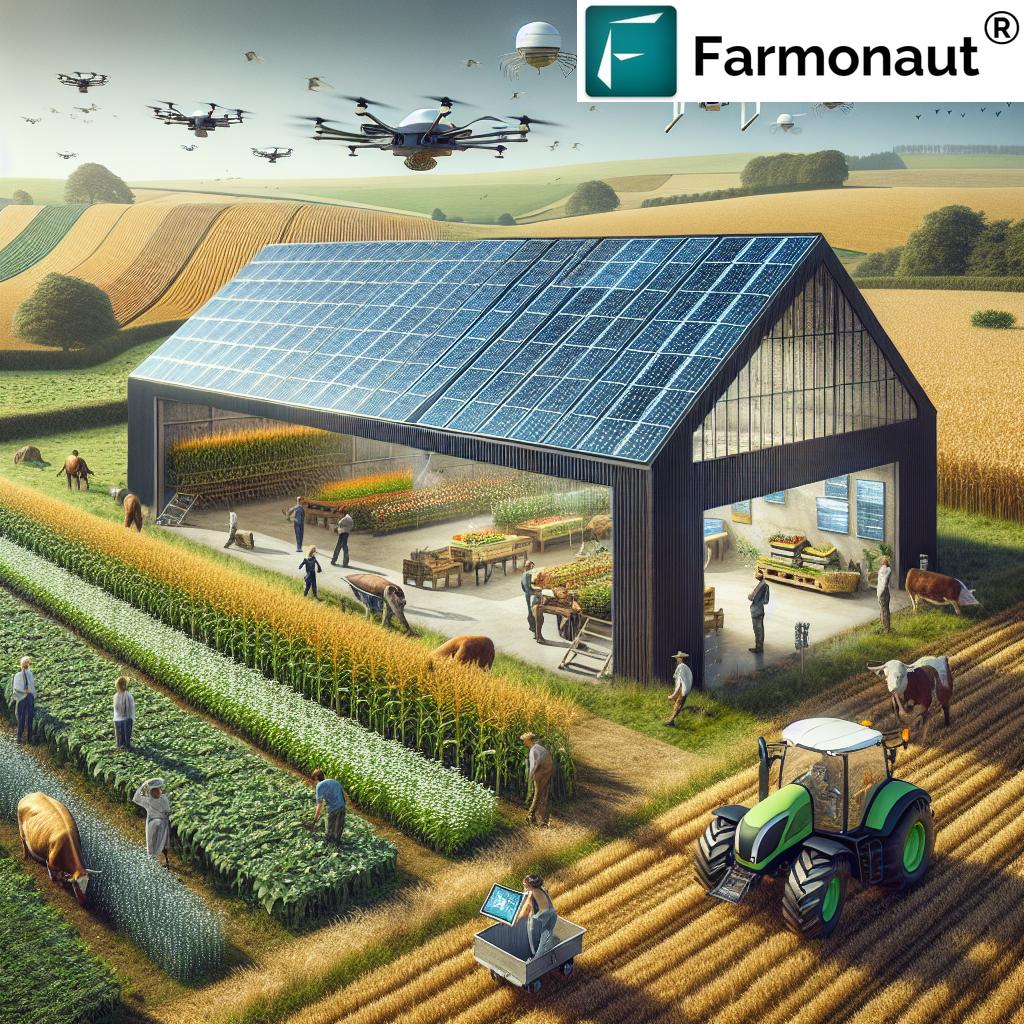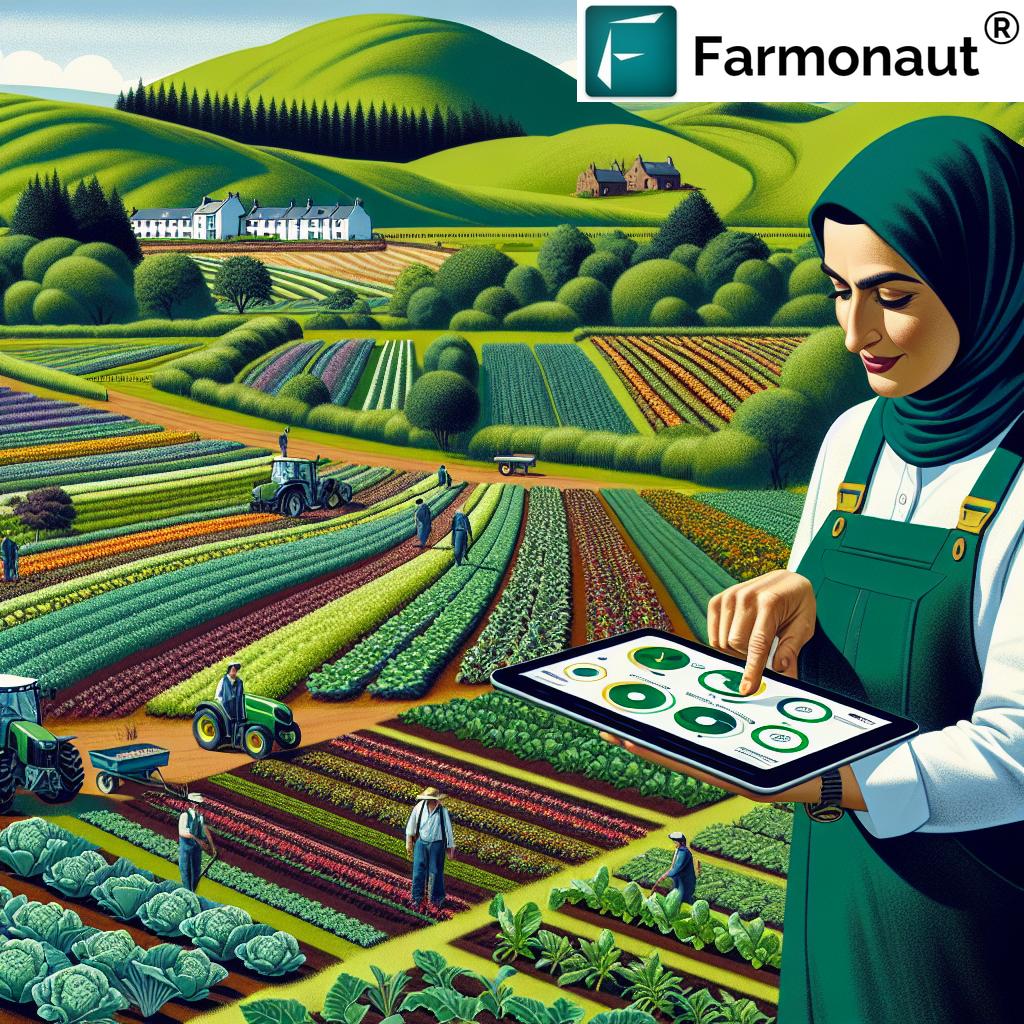The Ultimate Guide to Organic Farming in Scotland: Sustainable Practices for Soil Health and Local Food Production

“Scotland’s organic farming sector has grown by over 30% in the last decade, contributing significantly to local food production.”
Welcome to our comprehensive guide on organic farming in Scotland! In this article, we’ll explore the transformative power of sustainable agriculture practices and how they’re revolutionizing the Scottish agricultural landscape. From regenerative farming techniques to agroforestry benefits, we’ll delve into the principles of agroecology and their application in local food supply chains.
As we embark on this journey, we’ll uncover the importance of soil health management, biodiversity, and innovative agritech solutions that are shaping the future of farming in Scotland. Whether you’re a farmer, grower, or consumer interested in sustainable food production, this guide will provide valuable insights into creating resilient farm ecosystems while reducing environmental impact.
The Rise of Organic Farming in Scotland
Organic farming in Scotland has seen a significant surge in recent years, driven by increasing consumer demand for sustainably produced food and a growing awareness of environmental issues. This shift towards organic practices is not just a trend but a fundamental change in how we approach agriculture in the region.
- Increased adoption of pesticide-free farming
- Focus on soil health and biodiversity
- Integration of traditional knowledge with modern techniques
- Emphasis on local food supply chains
As we delve deeper into the world of organic farming, it’s crucial to understand the key principles that guide this sustainable approach to agriculture.
Core Principles of Organic Farming
Organic farming is built on a foundation of principles that prioritize environmental stewardship and sustainable production methods. These principles include:
- Soil Health Management: Nurturing the soil through natural methods
- Biodiversity: Encouraging a diverse ecosystem on the farm
- Natural Pest Control: Using biological methods instead of synthetic pesticides
- Crop Rotation: Enhancing soil fertility and breaking pest cycles
- Animal Welfare: Ensuring high standards of care for livestock
By adhering to these principles, organic farmers in Scotland are not only producing high-quality food but also contributing to the overall health of the environment.
Sustainable Agriculture Practices in Scotland
Scotland’s farmers are embracing a wide range of sustainable agriculture practices that align with organic farming principles. These practices are designed to enhance soil health, promote biodiversity, and ensure long-term sustainability of the land.
- Cover Cropping: Planting crops to protect and enrich the soil
- Composting: Creating nutrient-rich soil amendments
- Integrated Pest Management: Using natural predators to control pests
- Water Conservation: Implementing efficient irrigation systems
- Agroforestry: Combining trees and shrubs with crops or livestock
These practices not only benefit the environment but also contribute to the production of healthier, more nutritious food.
Regenerative Farming Techniques
Regenerative farming goes beyond sustainability, aiming to actively improve the health of the ecosystem. In Scotland, farmers are adopting regenerative techniques that work in harmony with nature to restore soil health and increase biodiversity.
- No-Till Farming: Minimizing soil disturbance to preserve soil structure
- Holistic Grazing: Managing livestock to mimic natural grazing patterns
- Polycultures: Growing multiple crop species together
- Permaculture Design: Creating self-sustaining agricultural ecosystems
These techniques are proving instrumental in reversing soil degradation and enhancing the resilience of Scottish farms.
Agroforestry Benefits in Scottish Agriculture
Agroforestry, the integration of trees and shrubs into crop and animal farming systems, is gaining traction in Scotland. This practice offers numerous benefits for both farmers and the environment:
- Improved soil structure and fertility
- Enhanced biodiversity and wildlife habitat
- Increased carbon sequestration
- Diversified income streams for farmers
- Protection against wind erosion and water runoff
By adopting agroforestry practices, Scottish farmers are creating more resilient and productive agricultural landscapes.
Soil Health Management in Organic Farming
At the heart of organic farming lies a deep commitment to soil health. Scottish organic farmers employ various strategies to maintain and improve soil quality:
- Crop Rotation: Alternating crops to balance nutrient demands
- Green Manures: Planting crops specifically to enrich the soil
- Organic Matter Addition: Incorporating compost and other organic materials
- Minimal Tillage: Reducing soil disturbance to preserve soil structure
- Cover Crops: Protecting soil from erosion and adding nutrients
These practices not only improve soil fertility but also enhance the soil’s ability to retain water and support beneficial microorganisms.

“Organic farms in Scotland have reported up to 50% higher biodiversity levels compared to conventional farms, supporting ecosystem health.”
Local Food Supply Chains in Scotland
Organic farming in Scotland is closely tied to the development of robust local food supply chains. This connection brings numerous benefits:
- Reduced food miles and carbon footprint
- Fresher, more nutritious produce for consumers
- Stronger connections between farmers and communities
- Increased food security and resilience
- Support for local economies
By prioritizing local food systems, organic farmers in Scotland are not just producing food; they’re fostering community relationships and supporting sustainable regional development.
Pesticide-Free Farming: Challenges and Solutions
One of the hallmarks of organic farming is the commitment to pesticide-free production. While this approach presents challenges, Scottish farmers have developed innovative solutions:
- Biological Pest Control: Using natural predators to manage pests
- Companion Planting: Growing complementary plants to deter pests
- Trap Crops: Planting sacrificial crops to attract pests away from main crops
- Physical Barriers: Using nets and fences to protect crops
- Crop Rotation: Breaking pest lifecycles through strategic planting
These methods not only protect crops but also contribute to the overall health of the farm ecosystem.
Agritech Solutions for Organic Farmers
While organic farming emphasizes natural processes, it doesn’t shy away from technology. Scottish organic farmers are increasingly adopting agritech solutions to enhance their operations:
- Precision Agriculture: Using data to optimize resource use
- Soil Sensors: Monitoring soil health in real-time
- Drone Technology: Surveying crops and assessing plant health
- Smart Irrigation Systems: Conserving water through targeted application
- Farm Management Software: Streamlining operations and record-keeping
These technologies are helping organic farmers increase efficiency while maintaining their commitment to sustainable practices.
At Farmonaut, we’re dedicated to supporting organic farmers with cutting-edge satellite-based farm management solutions. Our platform offers real-time crop health monitoring, AI-based advisory systems, and resource management tools to help farmers optimize their operations while adhering to organic principles.
Explore our solutions:
Climate-Smart Agriculture in Scotland
As climate change poses new challenges to agriculture, Scottish organic farmers are at the forefront of implementing climate-smart practices:
- Carbon Sequestration: Enhancing soil’s ability to store carbon
- Water Management: Implementing systems to cope with changing rainfall patterns
- Resilient Crop Varieties: Selecting plants adapted to new climate conditions
- Agroforestry: Using trees to mitigate extreme weather impacts
- Energy Efficiency: Reducing reliance on fossil fuels in farm operations
These practices not only help farms adapt to climate change but also contribute to mitigation efforts.
Agroecology Principles in Scottish Organic Farming
Agroecology, an approach that applies ecological principles to agricultural systems, is gaining ground in Scotland’s organic farming sector. Key principles include:
- Ecosystem Integration: Viewing the farm as part of the broader ecosystem
- Biodiversity: Promoting diverse plant and animal species on the farm
- Energy Efficiency: Minimizing external inputs and maximizing natural processes
- Social Responsibility: Considering the social impact of farming practices
- Cultural Preservation: Respecting and integrating traditional farming knowledge
By embracing these principles, Scottish organic farmers are creating more sustainable and resilient agricultural systems.
The Role of Hedgerows and Bees in Organic Farming
Hedgerows and bees play a crucial role in Scotland’s organic farming ecosystems:
- Hedgerows:
- Provide natural windbreaks
- Offer habitat for beneficial insects and wildlife
- Help prevent soil erosion
- Act as natural field boundaries
- Bees:
- Essential for pollination of many crops
- Indicator of overall ecosystem health
- Produce honey as an additional farm product
- Support biodiversity on the farm
By protecting and encouraging hedgerows and bee populations, organic farmers in Scotland are enhancing their farm’s productivity and ecological balance.
Sustainable Sourcing in Scottish Organic Agriculture
Sustainable sourcing is a key aspect of organic farming in Scotland, extending beyond the farm gate:
- Local Inputs: Prioritizing locally sourced seeds, compost, and other materials
- Renewable Energy: Using solar, wind, or biomass energy sources
- Ethical Partnerships: Collaborating with suppliers who share sustainability values
- Circular Economy: Finding uses for all farm outputs, minimizing waste
- Transparency: Providing clear information about sourcing practices to consumers
These sourcing practices help strengthen the entire organic food supply chain in Scotland.
Organic Certification Standards in Scotland
Organic certification in Scotland ensures that farms meet rigorous standards for organic production. Key aspects of certification include:
- Strict regulations on synthetic inputs
- Regular inspections and audits
- Detailed record-keeping requirements
- Specific standards for crop rotation and soil management
- Guidelines for animal welfare in livestock production
These standards help maintain the integrity of organic products and build consumer trust in the organic label.
Environmental Impact: Cleaner Rivers and Reduced Pollution
Organic farming practices in Scotland are contributing significantly to environmental conservation:
- Water Quality: Reduced chemical runoff leads to cleaner rivers and streams
- Soil Conservation: Organic practices prevent soil erosion and degradation
- Air Quality: Lower emissions due to reduced use of synthetic fertilizers
- Biodiversity: Creation of habitats for various plant and animal species
- Carbon Sequestration: Improved soil health leads to increased carbon storage
These environmental benefits extend far beyond the boundaries of organic farms, contributing to the overall health of Scotland’s ecosystems.
The Future of Organic Farming in Scotland
As we look to the future, organic farming in Scotland is poised for continued growth and innovation:
- Increased adoption of regenerative agriculture practices
- Further integration of technology in organic farm management
- Expansion of local and regional organic food networks
- Greater focus on climate resilience and adaptation
- Enhanced collaboration between farmers, researchers, and policymakers
These trends suggest a bright future for organic farming in Scotland, with benefits for farmers, consumers, and the environment alike.
Comparison of Organic vs. Conventional Farming Practices in Scotland
| Farming Aspect | Organic Farming | Conventional Farming |
|---|---|---|
| Soil Health Management | Use of cover crops and crop rotation | Reliance on synthetic fertilizers |
| Biodiversity Impact | Promotes diverse ecosystems | Often leads to reduced biodiversity |
| Pesticide Use | Natural pest control methods | Synthetic pesticides commonly used |
| Climate Resilience | Higher due to improved soil structure | Lower due to soil degradation |
| Water Quality Impact | Minimal chemical runoff | Potential for significant chemical runoff |
| Local Food Supply Chain Integration | Often closely integrated | Variable, often less integrated |
Conclusion
Organic farming in Scotland represents a powerful approach to sustainable agriculture, offering numerous benefits for soil health, biodiversity, and local food production. By embracing organic practices, Scottish farmers are not only producing high-quality food but also contributing to environmental conservation and rural development.
As we’ve explored in this guide, the principles of organic farming align closely with the goals of sustainability, resilience, and ecological stewardship. From regenerative techniques to innovative agritech solutions, Scottish organic farmers are at the forefront of a agricultural revolution that prioritizes long-term sustainability over short-term gains.
Whether you’re a farmer considering the transition to organic methods, a consumer interested in supporting sustainable food systems, or simply someone curious about the future of agriculture in Scotland, we hope this guide has provided valuable insights and inspiration.
Together, we can build a more sustainable and resilient food system that nourishes both people and the planet.
FAQ Section
Q: What are the main benefits of organic farming in Scotland?
A: Organic farming in Scotland offers numerous benefits, including improved soil health, increased biodiversity, reduced pollution, support for local food systems, and the production of high-quality, chemical-free food.
Q: How does organic farming contribute to climate change mitigation?
A: Organic farming practices such as cover cropping, minimal tillage, and agroforestry help sequester carbon in the soil, reduce greenhouse gas emissions, and increase farm resilience to climate impacts.
Q: What challenges do organic farmers face in Scotland?
A: Some challenges include pest and disease management without synthetic pesticides, meeting certification standards, competing with conventional products on price, and adapting to changing climate conditions.
Q: How can consumers support organic farming in Scotland?
A: Consumers can support organic farming by purchasing organic products, participating in local food initiatives, supporting farmers’ markets, and advocating for policies that promote sustainable agriculture.
Q: What role does technology play in organic farming?
A: Technology plays an increasingly important role in organic farming, from precision agriculture tools that optimize resource use to farm management software that streamlines operations and ensures compliance with organic standards.
For more information on how technology can support organic farming practices, explore Farmonaut’s innovative solutions:
API: https://sat.farmonaut.com/api
API Developer Docs: https://farmonaut.com/farmonaut-satellite-weather-api-developer-docs/
















